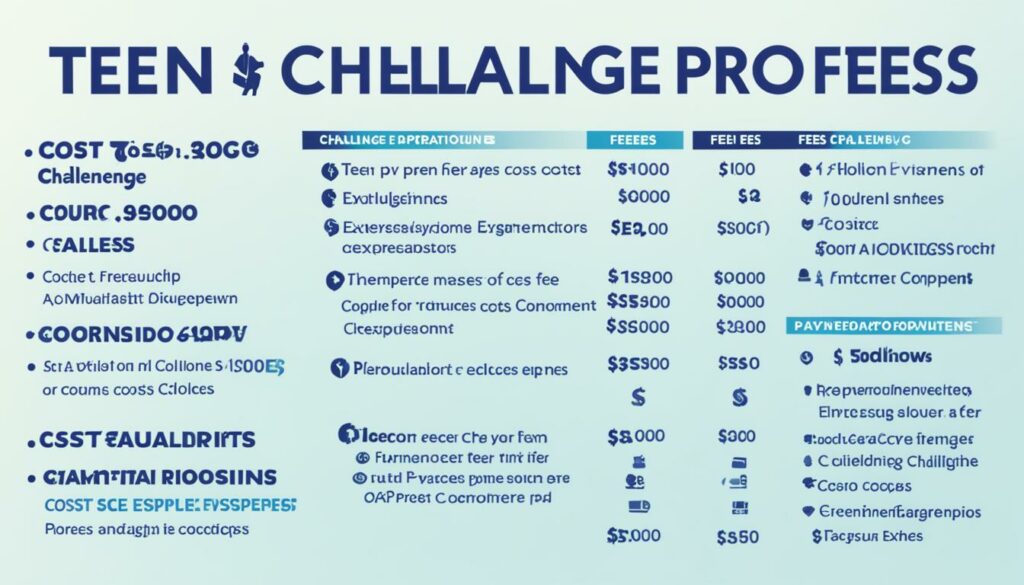Teen Challenge Program Costs Explained
Welcome to our article that aims to shed light on the cost of Teen Challenge programs. Teen Challenge is a renowned organization dedicated to helping individuals overcome drug and alcohol addiction through a life-transforming program. When considering enrolling in Teen Challenge, many individuals have questions about the program cost and available payment options. In this article, we will discuss the pricing structure, payment options, and potential financial assistance available for Teen Challenge programs.
Key Takeaways:
- Teen Challenge offers a transformative program for individuals struggling with drug and alcohol addiction.
- The cost of Teen Challenge programs varies, and it is important to understand the pricing structure.
- There are various payment options available, including insurance coverage, county funding, and financial assistance.
- It is advisable to contact the admissions department directly for the most accurate and up-to-date information on program costs and payment options.
- Teen Challenge aims to make their programs accessible and affordable through available financial aid options.
How to Apply to Teen Challenge

Applying to Teen Challenge is a straightforward process that offers multiple options for individuals seeking assistance in overcoming drug and alcohol addiction. Whether you prefer to communicate through text, phone calls, online applications, or in-person visits, Teen Challenge ensures that the application process is accessible to all. To begin your journey towards transformation and recovery, follow these simple steps:
- Text: Send a text message to [insert phone number] expressing your intent to apply to Teen Challenge. A dedicated admissions team member will guide you through the application process.
- Call: Dial [insert phone number] and speak directly with an admissions representative who will assist you with the application process, answer any questions you may have, and provide the necessary guidance.
- Apply Online: Visit the Teen Challenge website and navigate to the online application portal. Fill out the required information, including personal details and reasons for seeking assistance.
- In-Person Visit: If you prefer face-to-face interaction, you can visit the Admissions office in person. A compassionate staff member will guide you through the application process, providing support and answering any questions you may have.
The application process typically takes between 24 hours to 2 weeks, depending on various factors such as bed availability and the time required for document verification. You will be asked to provide information on your willingness to participate in the program, mental health status, medical conditions, legal status, and funding eligibility. The admissions team at Teen Challenge understands the importance of treating each individual with compassion and respect, ensuring that you receive the necessary support and guidance during the application process.
Applying to Teen Challenge – Key Points to Remember:
- Text, call, apply online, or visit the Admissions office in person.
- Application process duration varies based on bed availability and document verification.
- Provide information on willingness to participate, mental health status, medical conditions, legal status, and funding eligibility.
Understanding the Cost of Teen Challenge Program

The cost of the Teen Challenge program is determined on a case-by-case basis, taking into account various factors. While it would be difficult to provide an exact cost without assessing individual needs, understanding the pricing structure and available payment options can help potential participants make more informed decisions.
Insurance coverage is often used to finance a portion of the program. Many insurance providers offer coverage for Teen Challenge services, including mental health treatments. However, it’s important to note that insurance coverage may not extend to all program components, such as long-term residential recovery.
In addition to insurance, some individuals may be eligible for state or county funding. These funding options can help offset the cost of the program, making it more accessible to those who may be facing financial barriers.
For those who do not have insurance coverage or access to funding, Teen Challenge provides alternative payment options. These options may include self-payment plans, scholarships, and assistance programs. By exploring these options, individuals can find a payment plan that suits their financial situation and makes the program more affordable.
It’s important to note that the exact cost of mental health services may vary depending on the provider. Some providers may offer additional resources and support services as part of their program, which can affect the overall cost.
For a comprehensive understanding of the cost of the Teen Challenge program and available payment options, it’s best to contact the admissions team directly. They will be able to provide specific information based on your individual circumstances and help guide you through the process.
| Payment Options for Teen Challenge Program | Pros | Cons |
|---|---|---|
| Insurance Coverage | – Can offset a portion of the program cost | – May not cover all program components |
| State or County Funding | – Can significantly reduce program expenses | – Eligibility criteria may apply |
| Self-Payment Plans | – Provides flexibility in paying for the program | – Requires financial planning and commitment |
| Scholarships | – Can provide financial assistance based on merit or need | – Limited availability |
| Assistance Programs | – Offers additional financial support | – Eligibility criteria and funding availability may vary |
Age Requirements for Teen Challenge Programs
Teen Challenge programs aim to provide assistance and support for individuals of all ages who are struggling with drug and alcohol addiction. Understanding the age requirements for these programs is crucial when considering enrollment.
The general age range for participants in Teen Challenge programs is from 14 to 70+. However, it’s important to note that the age requirements may vary slightly between different programs. To ensure eligibility, it is recommended to inquire about the specific age criteria when applying.
Teen Challenge recognizes that addiction can affect individuals from various age groups. Whether you are a teenager seeking help or an adult looking for recovery options, there may be a program suitable for your needs.
Key Takeaways:
- Teen Challenge programs accept individuals of varying ages, with a general age range from 14 to 70+.
- Specific age criteria may vary between different Teen Challenge programs.
- It is important to inquire about the age requirements when applying.
If you or a loved one are struggling with drug or alcohol addiction, Teen Challenge may offer the support and resources needed to embark on the path to recovery. Understanding the age requirements and program eligibility will help you make an informed decision about seeking help.
Teen Challenge aims to provide a supportive and transformative environment for individuals of all ages, allowing them to overcome addiction and find hope for the future.
Insurance Coverage for Teen Challenge

When considering enrolling in the Teen Challenge program, it’s important to understand the options for insurance coverage. Teen Challenge accepts most insurance providers for their licensed treatment programs, including telehealth, outpatient, and residential services. This allows individuals to access the necessary care and support while utilizing their insurance benefits.
However, it’s important to note that the long-term residential recovery program offered by Teen Challenge is not typically covered by insurance. This program focuses on providing an immersive, long-term treatment experience that may not align with the coverage options provided by insurance providers.
Despite this limitation, the admissions team at Teen Challenge is committed to assisting applicants in determining their insurance coverage and screening for benefits. By working closely with prospective enrollees, they can provide guidance on insurance options and help individuals make informed decisions about financing their treatment.
For more information about insurance coverage for Teen Challenge and to understand how your insurance may be utilized in the program, it is recommended to contact the admissions team directly. They can provide personalized guidance and support in navigating the insurance process, ensuring that individuals receive the necessary care without unnecessary financial burden.
By partnering with insurance providers and offering comprehensive support services, Teen Challenge aims to make their life-transforming program accessible to individuals seeking recovery from drug and alcohol addiction.
Eligibility for County Funding and Financial Assistance

At Teen Challenge, we understand that the cost of our program may be a concern for some individuals. That’s why we offer various options for financial assistance, including county funding and other forms of support. Eligibility for these programs is determined on a case-by-case basis, taking into consideration specific circumstances and location.
If you are interested in exploring county funding or other financial assistance options, our admissions team is here to help. They can provide you with more information on the available resources and guide you through the eligibility process.
In cases where county funding or other types of funding are not available, we encourage individuals to seek support from their family, friends, community, or their church. It’s important to reach out and let your loved ones know about your journey to recovery. Together, we can find ways to cover the program costs and help you achieve lasting freedom from addiction.
Here are some options for financial assistance:
- County Funding: Depending on your location and circumstances, you may be eligible for financial support through county funding programs. Our admissions team can provide guidance on the application process and help determine if this is a viable option for you.
- Insurance Coverage: Many insurance providers offer coverage for our licensed treatment programs, including telehealth, outpatient, and residential services. However, it’s important to note that long-term residential recovery programs may not be covered. Our admissions team can assist you in determining your insurance coverage and screen for benefits.
- Community Support: Don’t underestimate the power of community support. Reach out to your family, friends, and local community organizations to explore possibilities for financial assistance. You may be surprised by the willingness of others to support your journey to recovery.
- Personal Network: Your personal network, including friends, family, and members of your church, can also be a valuable resource. Share your story, seek advice, and ask for help. They may be able to offer financial assistance or connect you with other resources.
Remember, financial challenges should not deter you from seeking help. Teen Challenge is committed to providing access to our life-transforming program, regardless of financial constraints. Reach out to our admissions team to explore the options available to you.
Program Admission with Pending Court Dates or Out-of-State Sentencing
Teen Challenge understands that individuals with pending court dates may still require addiction treatment and rehabilitation support. We take into consideration the severity and nature of their crimes when admitting them into our programs.
In some cases, individuals with court dates can enroll in our licensed treatment program and complete their sentencing requirements. This can be done either in their home state or at Teen Challenge, depending on the situation and court rulings.
During this period, participants are responsible for paying the program costs out-of-pocket. This ensures that they receive the necessary treatment and support they need while complying with the legal requirements of their sentencing.
At Teen Challenge, we believe in giving individuals a chance to overcome addiction and rebuild their lives, even when faced with pending legal matters. Our comprehensive program can provide the necessary guidance and tools to help individuals successfully navigate their legal obligations while focusing on their recovery.
For more information about program admission with pending court dates or out-of-state sentencing, please contact our admissions department.
Participant Testimonial:
“Being given the opportunity to enter Teen Challenge while I had a pending court date was a true blessing. The staff understood my situation and provided unwavering support throughout my treatment journey. I was able to complete my sentencing requirements while receiving the help I needed to overcome my addiction. Today, I am grateful for the second chance Teen Challenge gave me.”
– John Smith, Teen Challenge graduate
Waiting List for Residential Programs
When seeking admission to a Teen Challenge residential program, it’s important to be aware that availability may vary due to the number of individuals on the waiting list. Teen Challenge aims to schedule new participants based on the next available open bed at their desired location. However, in cases where immediate placement is not possible, individuals may be referred to another Teen Challenge campus to expedite the intake process.
If you’re considering enrolling in a Teen Challenge residential program, we recommend inquiring about the waiting list and estimated waiting times. It’s always best to be prepared and aware of any potential delays. To get the most accurate and up-to-date information on availability and waiting list status, we encourage contacting the admissions department directly.
| Benefits | Considerations |
|---|---|
|
|
Accepted Insurance Types and Non-coverage
If you’re considering enrolling in Teen Challenge, it’s important to understand the insurance options that are accepted and the coverage limitations. Most insurance providers are accepted for Teen Challenge’s licensed services, providing financial support for individuals seeking treatment for drug and alcohol addiction. This includes telehealth, outpatient, and residential services.
However, there are a few exceptions when it comes to insurance coverage. TriCare, which provides healthcare coverage for members of the military, cannot be used to pay for Teen Challenge programs. Additionally, Medicare benefits do not typically cover Teen Challenge programs.
It’s crucial to note that while insurance may cover a portion of the program, clients are often billed for the amount not covered by insurance. Therefore, it’s important to review your insurance policy and consult with the admissions team at Teen Challenge to determine the potential out-of-pocket expenses.
Insurance Coverage at Teen Challenge
Teen Challenge accepts a wide range of insurance providers, making it more accessible for individuals seeking treatment. With insurance coverage, you can ease the financial burden associated with the program costs. Insurance coverage may vary depending on your provider and policy, so it’s advisable to contact the admissions team to discuss your specific insurance coverage and benefits.
Here are a few examples of accepted insurance providers at Teen Challenge:
- Anthem Blue Cross Blue Shield
- Cigna
- UnitedHealthcare
- Aetna
- Humana
It’s important to remember that while insurance coverage can be a significant help, long-term residential recovery programs may not be typically covered by insurance. If insurance coverage is not an option for you, there are alternative funding sources available, such as county funding or financial assistance.
Non-coverage Insurance Options
Although Teen Challenge accepts various insurance providers, there are a few instances where insurance coverage may not be applicable or available. If you have TriCare or Medicare, it’s important to explore alternative payment options to cover the program costs. The admissions team at Teen Challenge can provide information on other available funding options, including county assistance and financial aid programs.
| Insurance Provider | Accepted |
|---|---|
| Anthem Blue Cross Blue Shield | Yes |
| Cigna | Yes |
| UnitedHealthcare | Yes |
| Aetna | Yes |
| Humana | Yes |
Conclusion
Teen Challenge offers a transformative program for individuals struggling with drug and alcohol addiction. The program provides hope, guidance, and support to those seeking recovery. One of the concerns individuals often have is the cost of the program, but Teen Challenge offers various options to make it more accessible.
Insurance coverage is available for their licensed treatment programs, including telehealth, outpatient, and residential services. County funding may be an option for some individuals, and financial assistance is also available. It’s important to reach out to the admissions department directly to get the most accurate and up-to-date information on pricing, payment options, and financial aid availability.
When considering applying to Teen Challenge, it’s essential to understand the admissions process. The application timeline may vary depending on factors such as bed availability and document verification. It’s also important to meet the age requirements for the specific program and inquire about program eligibility.
Overall, Teen Challenge is committed to helping individuals overcome addiction and find a path to a better future. By addressing the cost of the program through insurance coverage, county funding, and financial assistance, they aim to make their life-transforming program accessible to those in need.
FAQ
How much does Teen Challenge cost?
The cost of the Teen Challenge program is determined on a case-by-case basis. It can vary depending on factors such as the program length and the level of care required.
What are the prices for Teen Challenge?
Teen Challenge program prices can vary. It’s best to contact the admissions department directly for the most accurate and up-to-date information on pricing.
Are there fees for Teen Challenge?
Yes, there are fees associated with the Teen Challenge program. The specific fees will differ depending on the individual’s circumstances and the program they are enrolled in.
What are the payment options for Teen Challenge?
Payment options for Teen Challenge can include insurance coverage, county funding, or self-payment. It’s advisable to discuss the available payment options with the admissions department.
Is there financial assistance available for Teen Challenge?
Yes, there may be financial assistance available for Teen Challenge. Eligibility for financial aid can vary, and individuals are encouraged to speak with the admissions team to discuss available options.
How do I apply to Teen Challenge?
To apply to Teen Challenge, you can text, call, apply online, or visit the Admissions office in person. The application process typically takes between 24 hours to 2 weeks.
What is the Teen Challenge application process?
The Teen Challenge application process includes an assessment of your willingness to participate, mental health evaluation, medical review, legal status screening, and funding eligibility determination.
What are the age requirements for Teen Challenge programs?
Teen Challenge programs accept individuals of varying ages, usually from 14 to 70+. Each program has specific criteria for age eligibility, and it’s important to inquire about the age requirements when applying.
Does Teen Challenge accept insurance?
Yes, most insurance providers are accepted for licensed treatment programs at Teen Challenge, including telehealth, outpatient, and residential services. However, the long-term residential recovery program is typically not covered by insurance.
Can I use Medicare benefits to cover the cost of Teen Challenge programs?
No, Medicare benefits do not cover the cost of Teen Challenge programs. Clients are typically billed for the amount not covered by insurance.
What are the eligibility requirements for county funding and financial assistance?
Eligibility for county funding and financial assistance for Teen Challenge can vary depending on the individual’s circumstances and their location. It’s best to speak with the admissions team to determine eligibility and explore available options.
Can I join Teen Challenge if I have pending court dates or out-of-state sentencing?
In some cases, individuals with pending court dates can join Teen Challenge programs. The severity and nature of their crimes will be taken into consideration. They may be able to complete their sentencing requirements either in their home state or at Teen Challenge, with out-of-pocket payment during that period.
What is the waiting list for residential programs at Teen Challenge?
The availability of beds at Teen Challenge can vary, and there may be a waiting list for residential programs. It’s advisable to inquire about waiting times when considering enrollment.
What types of insurance are accepted by Teen Challenge?
Most insurance providers are accepted for Teen Challenge’s licensed services. However, it’s important to contact the admissions team to determine the specific insurance coverage and benefits.
Does TriCare cover the cost of Teen Challenge programs?
No, TriCare cannot be used to pay for Teen Challenge programs.







